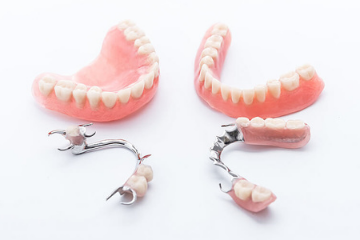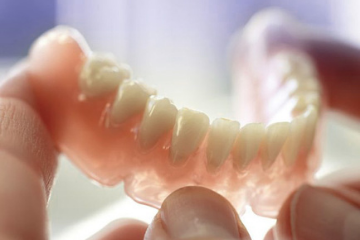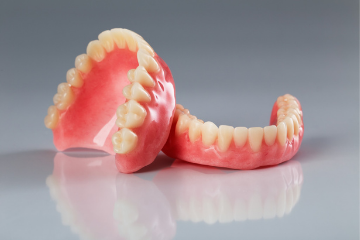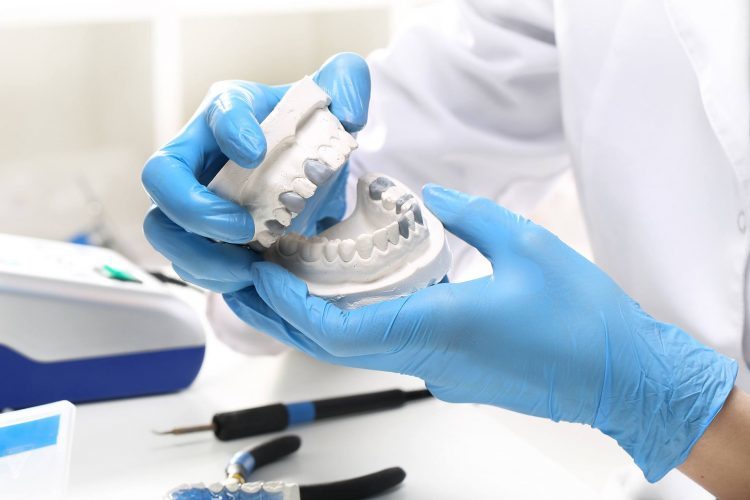What are Dentures?
Removable artificial teeth for replacing missing teeth, commonly known as "false teeth".
BPS dentures are the product of effective cooperation between dentists and dental technicians. The results are high-quality tooth replacements for discerning patients.
Exceptionally high-quality dentures, using beautiful teeth and high strength polymers by an injection molding technique.
The precision of these dentures are unsurpassed and hence the comfort and esthetics set them apart from the conventional denture.

Types of dentures

Partial denture
Partial dentures are fitted to replace teeth that are missing. In such cases, partial dentures are used when there are still healthy teeth left, and these partial dentures often come with clasps that hold your denture in place by hooking on to your tooth.

Immediate denture
In some situations whereby extraction of front teeth is required, the aesthetic look may be a concern and you may require something to close the missing gap immediately. In such cases, immediate dentures can be made prior to the extraction and inserted right after the extraction is done. However, some adjustments and reline of the denture may be required a few months later after the extraction wound heals and recover so that the denture will fit better.

Full/Complete denture
Full/complete dentures replace the whole row of teeth (either upper/ lower). In such a situation, there are no longer any natural teeth left on the entire arch. Since there are no longer any teeth to hold the denture in place, the complete denture relies greatly on your teeth and gums tissues for retention.
Fitting your dentures

Fabrication of dentures usually takes a few visits to the clinic, and in most cases, the success of denture treatment relies greatly on the cooperation and understanding of patients.
Fabrication of a denture generally involves a few stages.
- Primary Impression taking
- Master impression taking (more accurate version using a customized special tray)
- Maxillomandibular relationship (MMR) record/ Bite registration
- Try-in of a wax mock-up version of the denture
- Issue of final denture
- Review and adjustment
Depending on the number of teeth required for replacement and also the complexity of each case, some steps may be skipped or done concurrently on the same visit.
Common situations after receiving new dentures
- Post-delivery pain or discomfort – lasting a few days to several weeks. The new dentures press on the oral soft tissues and lie in the tongue space. Tender areas or ulcers may develop at first, which will heal over time after adjustments to the denture(s). Patients must wear the denture(s) preferably on the day when they are reviewed so that the doctor can identify the problem areas.
- Dentures move during function – dentures are removable. The fewer teeth that are left for the denture to hold on to, the more the denture depends on the soft tissues for support and retention. When there are no teeth, full complete dentures are supported by the ridge and the surrounding soft tissues. Lower full dentures are usually more mobile and feel loose as it is only supported by a narrow ridge and lies in the space of the tongue. The patient will have to learn how to control and hold the dentures with his/her cheek muscles and tongue.
- Difficulty in eating – chewing food may be uncomfortable, even painful at first. Patients may need to return to the dental clinic for adjustments. Patients may bite on their cheeks, tongue, or lips initially. The dentures may move when the patient chews. Patients should practice eating with their new denture(s), starting with soft food cut into small pieces, and biting on both sides, eventually progressing to harder food. Sticky food should be avoided.
- Difficulty in speaking – Initially, the pronunciation of words may be affected. They may have more saliva. With use and practice, patients will learn how to speak properly with the new dentures.
- It is common to feel uncomfortable with new dentures at the beginning, but feel free to return for dentures adjustments if required. It usually takes a few days or even weeks and months to get comfortable wearing them. The key to successfully adapting to a new set of dentures is to never give up adjusting and wearing it.
Frequently asked questions about denture
Taking good care of your denture is as important as taking care of your teeth.
They should be removed after every meal to wash off any food particles. Brush the denture gently with a soft toothbrush and soak it in a denture cleansing solution once a week to disinfect and clean the denture.
When not wearing, always soak the denture in water to prevent it from losing its shape. Poor denture hygiene may result in stains, bad odor, and oral infections.
Depending on how badly broken the denture is, it may be possible to fix/ repair it. To denture wearers, please feel free to contact us for an appointment to allow our dentist to check for you.
